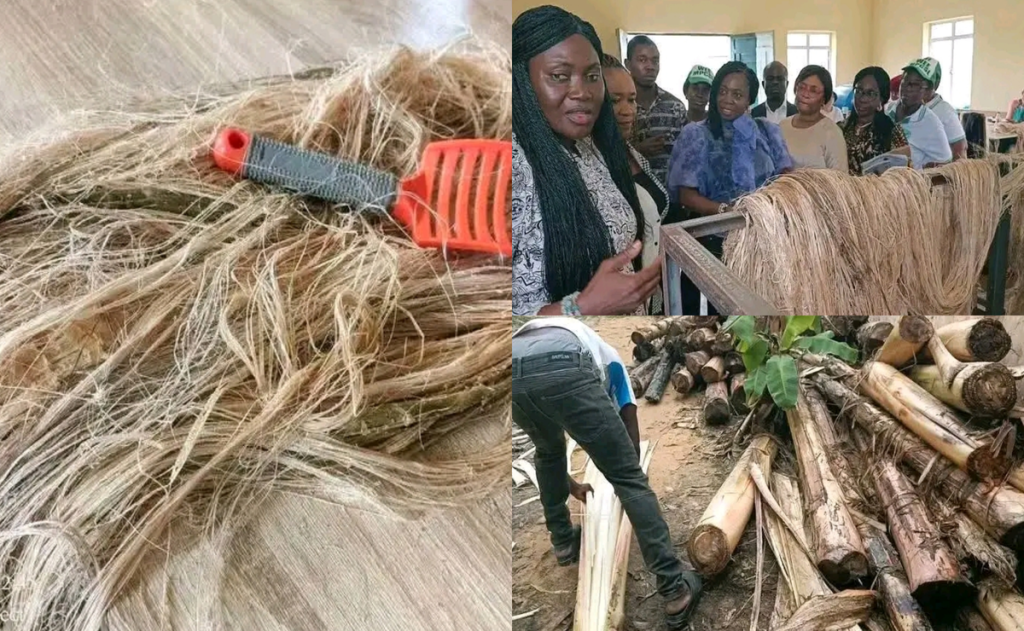
Mrs. Tare Kuromene transforms plantain stem hair into sustainable, high-quality extensions. Pic: Social Media
Plantain stem hair extensions align innovation with waste-to-value goals
The company’s approach treats fibres from plantain pseudostems—typically left to decompose after harvest—and reforms them into strands designed for styling, braiding, and wig production.
According to project descriptions and public demonstrations, the method emphasises material efficiency, durability, and a natural feel comparable to conventional products.
Early market reception indicates interest from salon professionals and retail buyers seeking lower-plastic, locally sourced alternatives to synthetic extensions and imported human hair.
Sector observers note that the model fits a wider waste-to-value trend: redirecting agricultural by-products into commercial supply chains that support farmers, processors, and downstream retailers.
In practical terms, the approach can reduce disposal costs on farms while creating inputs for small manufacturers and artisanal stylists. It also encourages product traceability within Nigeria’s beauty market, where provenance and sustainability claims are drawing more scrutiny.
Plantain stem hair extensions target performance, consistency, and cost control
Performance benchmarks shared by the company focus on weight, tensile strength, and wear characteristics under salon conditions. The fibre is positioned as lightweight and heat-tolerant within recommended styling ranges, with an emphasis on consistent batch quality.
Pricing strategy is aimed at keeping retail costs competitive with mid-tier synthetic options while delivering a longer service life, thereby improving value for consumers and salons.
Standardization is central to scaling. Production lots are tested for uniform diameter, colourability, and strand resilience to reduce variability during braiding and wig making.
The firm has outlined plans to expand training for stylists on fibre handling, care, and end-of-life reuse where feasible. By formalising these steps, the business seeks to reduce returns and build repeat demand across regional markets.
Plantain stem hair extensions and the supply chain opportunity
Plantain cultivation is widespread across southern Nigeria, providing a steady source of stems after harvest. Establishing structured offtake from growers can stabilise raw-material supply, while pre-processing hubs near farm clusters may cut logistics costs and limit spoilage.
For rural communities, the model offers an additional revenue stream and potential jobs in sorting, drying, and initial fibre preparation before final processing.
Sustainability claims emphasise material substitution and circular design
The headline sustainability benefit is material substitution: replacing plastic-derived synthetic strands with plant-based fibres. Lifecycle considerations include water use during treatment, chemical inputs, and energy demand for drying and finishing.
The company says its workflow prioritises low-toxicity inputs and recoverable process water, and it has public materials outlining ambitions for biodegradable packaging and broader natural-fibre product lines.
Background details on the brand’s natural-fibre portfolio and positioning can be found in open company resources describing products derived from agricultural waste streams and other plant fibres embedded within natural fibres.
Independent assessments will be important as volume grows. Analysts recommend third-party verification of fibre content, durability, and compostability claims to align with international eco-labels.
For export prospects, conformity with hair-product standards and consumer-safety regulations in target markets will shape route-to-market timelines.
Market context: Nigeria’s beauty economy and demand for alternatives
Nigeria’s beauty and personal care sector remains one of Africa’s most dynamic, with strong demand for hair extensions across price segments. The category is traditionally served by synthetic fibres and imported human hair, each with cost and supply-chain limitations.
A viable plant-based option could diversify sourcing, reduce reliance on imports, and anchor new manufacturing capacity domestically.
For salons and retailers, predictable supply and technical support will be decisive. Training on colour matching, heat limits, washing, and storage can lower failure rates and customer complaints. Clear care labels and usage guidance can also reduce waste by extending product life and encouraging repair or reuse where appropriate.
Plantain stem hair extensions and quality assurance
To retain customer confidence, quality control protocols track fibre uniformity, knotting resistance, and frizz management after repeated styling cycles.
Packaging now includes guidance on installation techniques and compatible styling tools to minimise damage. Return policies are being standardised as retail networks expand beyond early adopters.
Recognition and support underpin scale-up ambitions
Public interest in the project has coincided with media coverage and policy-aligned entrepreneurship programmes. Local reports in mid-2025 referenced state-level backing aimed at accelerating production capacity and job creation in Bayelsa’s small-industry ecosystem.
Coverage describing a significant interest-free facility linked to the expansion of the plantain-fibre hair venture framed it as part of a broader enterprise support agenda in the state economy; details of that announcement were attributed to a June 2025 update highlighting an interest-free loan tied to production growth and workforce expansion.
Related By Category: Aliko Dangote urges CEOs to invest boldly in Africa’s future
While external finance can speed up procurement of machinery and quality-assurance equipment, operational discipline remains the core determinant of scale—particularly workforce training, safety standards, supplier contracts, and fulfilment reliability during demand spikes.
Outlook: From pilot runs to broader distribution
Near-term priorities include expanding raw-material offtake agreements with farm clusters, improving pre-processing efficiency, and formalising distributor relationships in major urban markets.
As the business completes additional pilot runs and stress tests under salon conditions, the objective is to validate repeatability at higher volumes while maintaining quality.
Over the medium term, export potential depends on compliance with destination-market rules, transparent labelling, and proof points on durability and user safety. The brand’s roadmap also references category extensions—accessories and household goods—built on the same plant-based fibre platform described in its public materials on natural fibres.
If execution matches demand, Nigeria could add a distinctive, lower-plastic option to the global hair-products mix, supported by a rural-to-urban value chain that keeps more of the margin within the country.
As consumer preference tilts toward products with traceable origins and reduced environmental footprint, the proposition behind plantain stem hair extensions will be tested on consistency, price, and performance.
For now, the initiative stands as a case study in pairing local resources with market-ready design to meet everyday needs in the Nigerian beauty economy.


